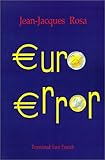|
|
Help |
| Home - Basic C - Currency Economics & Monetary Systems (Books) | |
e99 Online Shopping Mall
|
|
Help |
| Home - Basic C - Currency Economics & Monetary Systems (Books) | |
| Back | 81-100 of 100 |
click price to see details click image to enlarge click link to go to the store
| 81. Optimal currency area theory in the European context by Jochen Strack | |
| Unknown Binding:
Pages
(1996)
Asin: B0006QOGBC Canada | United Kingdom | Germany | France | Japan | |
| 82. Statement by Arthur F. Burns before the Committee on Banking, Currency, and Housing, House of Representatives, February 3, 1976 by Arthur F Burns | |
| Unknown Binding: 21
Pages
(1976)
Asin: B0006WCGFO Canada | United Kingdom | Germany | France | Japan | |
| 83. The EMS, the EMU, and the transition to a common currency (NBER working papers series) by Kenneth Froot | |
| Unknown Binding:
Pages
(1991)
Asin: B0006D5ZF6 Canada | United Kingdom | Germany | France | Japan | |
| 84. Visits to eculand: Reflections upon its financial system (1992 and beyond) by Graham Bishop | |
| Unknown Binding: 18
Pages
(1991)
Asin: B0006DHF68 Canada | United Kingdom | Germany | France | Japan | |
| 85. The Currency and Financial System of Mainland China (China in the 20th century) by Tadao Miyashita | |
| Paperback: 278
Pages
(1976-10-31)
Isbn: 0306707586 Canada | United Kingdom | Germany | France | Japan | |
| 86. The EMS with the ECU at centre stage: A proposal for reform of the European exchange rate system (EUI working paper) by Alfred Steinherr | |
| Unknown Binding: 6
Pages
(1988)
Asin: B0007BY8M8 Canada | United Kingdom | Germany | France | Japan | |
| 87. Federal Reserve policy (Postwar economic studies) by Karl R Bopp | |
| Paperback: 119
Pages
(1947)
Asin: B0007DS63I Canada | United Kingdom | Germany | France | Japan | |
| 88. Was the Federal Reserve fettered?: Devaluation expectations in the 1932 monetary expansion (NBER working paper series) by Chang-Tai Hsieh | |
| Unknown Binding:
Pages
(2001)
Asin: B0006RKWJ6 Canada | United Kingdom | Germany | France | Japan | |
| 89. An essay on the revived Bretton Woods system (NBER working paper series) by Michael P Dooley | |
| Paperback:
Pages
(2003)
Asin: B0006SBWV2 Canada | United Kingdom | Germany | France | Japan | |
| 90. EMS realignment? by Gilman C Gunn | |
| Unknown Binding: 9
Pages
(1986)
Asin: B0007BV3PI Canada | United Kingdom | Germany | France | Japan | |
| 91. Spatial Dynamics of European Integration: Regional and Policy Issues at the Turn of the Century (Advances in Spatial Science) | |
 | Hardcover: 367
Pages
(1999-08-27)
list price: US$139.00 -- used & new: US$22.99 (price subject to change: see help) Asin: 3540658173 Canada | United Kingdom | Germany | France | Japan |
|
Editorial Review Product Description | |
| 92. The Euro: A Challenge and Opportunity for Financial Markets (Routledge International Studies in Money and Banking) | |
 | Hardcover: 416
Pages
(2000-06-13)
list price: US$240.00 -- used & new: US$235.20 (price subject to change: see help) Asin: 0415217105 Canada | United Kingdom | Germany | France | Japan |
|
Editorial Review Product Description | |
| 93. Euro Error by Jean-Jacques Rosa | |
 | Paperback: 264
Pages
(1999-12-01)
list price: US$18.95 -- used & new: US$18.95 (price subject to change: see help) Asin: 1892941007 Average Customer Review: Canada | United Kingdom | Germany | France | Japan |
|
Editorial Review Product Description Customer Reviews (2)
| |
| 94. Mexico 1994: Anatomy of an Emerging-Market Crash | |
 | Paperback: 326
Pages
(1998-02)
list price: US$22.95 -- used & new: US$27.20 (price subject to change: see help) Asin: 0870031546 Canada | United Kingdom | Germany | France | Japan |
|
Editorial Review Product Description | |
| 95. The euro area and the world economy.(Cover Story): An article from: Finance & Development by John Green, Phillip L. Swagel | |
| Digital: 8
Pages
(1998-12-01)
list price: US$5.95 -- used & new: US$5.95 (price subject to change: see help) Asin: B00098KMLK Canada | United Kingdom | Germany | France | Japan | |
|
Editorial Review Product Description | |
| 96. The effects of the substitution of dollars for gold for the distribution of the adjustment burden and the control of the world money supply (Discussion paper) by Don E Roper | |
| Unknown Binding: 25
Pages
(1972)
Asin: B0006WYUN0 Canada | United Kingdom | Germany | France | Japan | |
| 97. Money and Banking: Analysis & Policy by Charles R. Whittlesey, Arthur M. Freedman, Edward S. Herman | |
 | Hardcover: 617
Pages
(1962)
Asin: B001DU5AB0 Canada | United Kingdom | Germany | France | Japan |
| 98. Endless Money: The Moral Hazards of Socialism by William Baker | |
 | Hardcover: 417
Pages
(2009-11-02)
list price: US$29.95 -- used & new: US$12.75 (price subject to change: see help) Asin: 047047615X Average Customer Review: Canada | United Kingdom | Germany | France | Japan |
|
Editorial Review Product Description A detailed look at how, and why, the American financial system has reached its current state Today's economy and capital markets are faced with the long-term buildup of public and private credit. Furthermore, we face higher taxes, greater spending, and more debt. We are now at a critical crossroads and our leaders have few realistic solutions. Proposals calling for tax reforms or fewer regulations have fallen on deaf ears. In fact, U.S. democracy has become more socialist and reform is needed immediately. Endless Money is an examination of how the U.S. government and the country's financial systems have embraced socialism, and why cultural deterioration reinforces the trend and jeopardizes democracy. In it, author William Baker sees this socialism embodied in two things. The first is the socialization of income, the second is the socialization of credit. Insightful and informative, Endless Money examines our current economic condition and describes what the United States can do to get back on the right economic track. Customer Reviews (5)
| |
| 99. America and Euroland.: An article from: World Policy Journal by Steven Everts | |
| Digital: 16
Pages
(1999-12-22)
list price: US$5.95 -- used & new: US$5.95 (price subject to change: see help) Asin: B00099NKAO Canada | United Kingdom | Germany | France | Japan | |
|
Editorial Review Product Description | |
| 100. Challenges for Central Banks in an Enlarged EMU | |
 | Kindle Edition: 292
Pages
(2005-01-24)
list price: US$79.95 Asin: B001QTWIU4 Canada | United Kingdom | Germany | France | Japan |
|
Editorial Review Product Description | |
| Back | 81-100 of 100 |